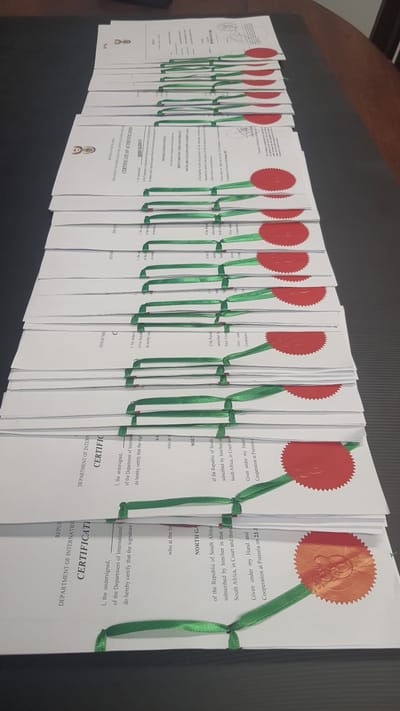EXPERT APOSTILLE CERIFICATE SERVICE - PRETORIA

Introduction to Apostille:
What is an Apostille and why is it necessary?
An Apostille is an official authentication certificate for public documents that are used abroad. It certifies the origin of the document and verifies the signature or stamp on it. The Apostille certificate is necessary when a public document from South Africa will be used in a foreign country, especially if the country is a signatory or member state to the Hague Convention of 5 October 1961.
Understanding the Hague Convention: South Africa and the Hague Convention
South Africa is a member of the Hague Convention that abolishes the requirement of consular legalisation for foreign public documents. Under this Convention, member countries have agreed to replace legalisation with a single formality, the issuance of an Apostille certificate. The Convention facilitates the exchange and verification of public documents, and an Apostille is required for all contracting states.
Verifying the authenticity of public documents:
Why is an Apostille certificate needed?
The recipient of a public document in the Country of Destination cannot judge the authenticity of the document merely by looking at it. He or she may not be familiar with the identity or official capacity of the person signing the document or the identity of the authority whose seal or stamp it bears. Hence, states/countries require that the origin of a foreign public document must be certified by an official who is familiar with the document. This is why the process of authentication was developed, which refers to verifying the origin of a public document.
Documents that require Apostille:
Which documents need an Apostille certificate?
Some of the documents that often require an Apostille certificate include Home Affairs documents and Police Clearances (Birth Certificate, Marriage Certificate, Death Certificate, Divorce Decrees, Letter of No Impediment to be married abroad), Academic documents (SA Degree and Diploma certificates, TEFL certificates, Foreign degrees, Other academic Apostilles), and Other documents (Background Check, Single Status Affidavit, Power of Attorney, Copy of Passport, Copy of Driver’s License, Transcripts, Authorisation Letter, Travel Consent Letter, Articles of Incorporation, Certificate of Good Standing, Certification of Free Sale, Certification of Origin, Corporate Power of Attorney, Commercial Invoice). Please note that some of these documents may have to be notarised before being apostillised.
What does an Apostille from South Africa look like?
Apostille Certificate appearance
An Apostille from South Africa is an extra page bound or attached to the original document. It states that the person issuing or signing the document is legitimate and verifies the signature on the document and/or the stamp affixed to it. The Apostille page is attached by a ribbon.
Do I have to notarise and apostille my documents?
Notarisation and Apostille requirements In some cases, official South African documents will have to be notarised before being apostillised. If the country where you intend to use the document is also a signatory to the Hague Convention, then only an Apostille certificate is required. However, it is the responsibility of each individual to find out whether they require an Apostille or Certificate of Authentication attached to their document. Usually, the authority to which the document is being submitted can advise on this.
Conclusion:
In conclusion, obtaining an Apostille certificate is a necessary step when using South African public documents abroad. It certifies the origin of the document and verifies the signature or stamp on it, facilitating the exchange and verification of public documents.


